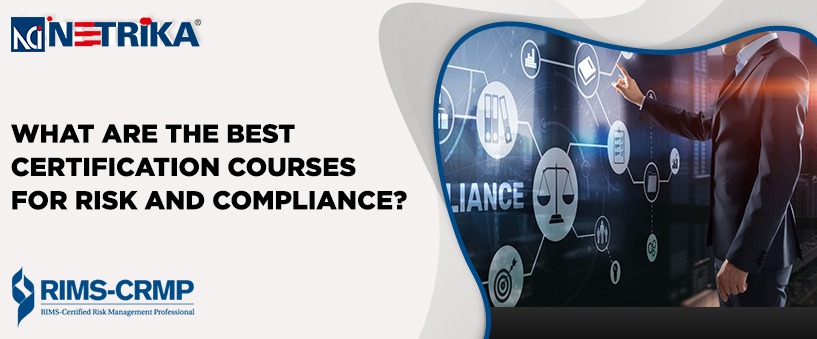
What are the best certification courses for risk and compliance?
Risk management is an essential part of any organization’s operations, regardless of its size, industry, or location. The risk management certification course (RIMS-CRMP) offered by Netrika Consulting is designed to provide individuals and organizations with the knowledge, skills, and tools needed to identify, assess, and manage risks effectively. It encompasses a wide range of topics, including risk management principles, risk identification, risk assessment, risk mitigation, and risk monitoring.
Being one of the best certification courses for risk management, it is also highly interactive, with hands-on exercises, case studies, and group discussions. This interactive approach allows professionals to learn from each other and share their experiences and perspectives. It also encourages active participation and engagement, which helps to reinforce learning and retention.
The certified risk manager certification course is particularly relevant for professionals in risk management, internal audit, compliance, governance, and finance. It is also useful for business owners, executives, and managers who want to understand the risks their organizations face and develop effective risk management strategies.
Risk management course benefits for the professional and organisation
Risk management is an essential function for any organization, as it helps identify, assess, and mitigate potential risks that could impact the business. To be effective in this role, professionals enrolling for the top risk management certifications require specialized knowledge and skills, which can be obtained through the course.
Here are some of the key benefits of a risk management course:
- Enhance knowledge and skills: A certified risk manager certification course provides in-depth training on the principles, methodologies, and best practices of risk management. Participants learn about risk identification, assessment, mitigation, and monitoring, as well as how to develop and implement risk management strategies. They also gain practical skills, such as risk analysis, risk modelling, and risk communication, that can be applied in real-world scenarios.
- Expand career opportunities: A risk management certification course can help professionals enhance their credentials and stand out in the job market. Employers value individuals with specialized skills and training in risk management, and a certification or diploma from a reputable institution can be a valuable asset when seeking new job opportunities or career advancement.
- Network with peers: The top risk management certifications provide opportunities for participants to network with other professionals in the field. This can be valuable for sharing knowledge, exchanging ideas, and building relationships that could lead to new job opportunities or business partnerships.
- Keep up-to-date with emerging trends: Risk management is a constantly evolving field, with new risks and challenges emerging all the time. A risk management certification course can help professionals stay up-to-date with the latest trends, best practices, and technologies in the field, ensuring that they are equipped to address new risks and challenges as they arise.
- Improve organizational performance: Effective risk management is critical for the success of any organization. By taking a risk management course, professionals can gain the knowledge and skills they need to help their organization identify and mitigate potential risks, thereby improving performance, reducing costs, and enhancing the organization’s overall resilience.
Skills needed to gain risk management certificate credentials
To gain a risk management certificate credential, you will need to demonstrate a set of specific skills and knowledge in the field of risk management. These skills and knowledge can be acquired through specialized training, education, and experience. Here are some of the key skills required to gain a risk management certificate credential:
- Risk identification: The ability to identify potential risks that could impact an organization or project is a critical skill for a risk management professional. This requires a thorough understanding of the organization or project, as well as the external factors that could pose a risk.
- Risk assessment: Once potential risks have been identified, risk management professionals must assess the likelihood and impact of each risk. This requires knowledge of risk assessment methodologies and tools, as well as the ability to analyze data and make informed judgments.
- Risk mitigation: After assessing the potential risks, risk management professionals must develop strategies to mitigate or manage those risks. This requires a deep understanding of risk management principles and best practices, as well as the ability to develop and implement effective risk mitigation strategies.
- Risk communication: Risk management professionals must be able to communicate the risks and mitigation strategies to key stakeholders, including senior management, project teams, and external partners. This requires strong communication skills, including the ability to present complex information in a clear and concise manner.
- Analytical skills: Risk management professionals must be able to analyse data and make informed decisions based on that data. This requires strong analytical skills, including the ability to collect and analyse data, identify trends and patterns, and draw conclusions.
- Project management skills: Risk management is often a critical component of project management. Therefore, risk management professionals must have strong project management skills, including the ability to plan, execute, and monitor projects effectively.
Gaining a risk management certification credential requires a set of specialized skills and knowledge in the field of risk management. By acquiring these skills through specialized training, education, and experience, professionals can demonstrate their expertise in risk management and enhance their career opportunities in the field

